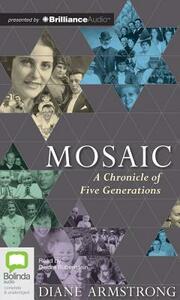Take a photo of a barcode or cover
I did enjoy this although it took me a while to finish. There were a few places it dragged a little and there was some kind of slightly odd writing and word choice in places, but the ending pretty much made it all worthwhile. Good story, pretty well done. I was surprised that so many of the 11 children in the author's father's family survived the war, since they mostly were in Poland when the war started. Pretty amazing.
Poland.
Fascinating history of a Polish family - such a rich history.
Fascinating history of a Polish family - such a rich history.
‘I would create a mosaic out of their memories.’
Ms Armstrong’s family memoir, spanning five generations of her Jewish family, begins with a divorce. In 1890, in Krakow, her grandfather Daniel Baldinger sought and received a divorce from his wife of ten years, Reizel, because they had not yet had a child. While Daniel Baldinger loved his wife, he believed that ‘a man must have sons to say Kaddish for him when he dies’. By 1913, Daniel and his second wife Lieba had eleven children, including six sons. Their first son, Avner, was born in 1895.
When her uncle Avner died in 1985, Ms Armstrong decided to interview her five remaining aunts and uncles to piece together a mosaic from their memories. The resulting family history spans more that one hundred years, five generations of family and several continents. The family journey takes us through the horrors of the Holocaust and pain of dislocations.
‘In wartime the smallest decision had enormous repercussions because once you veered off one path and followed another, there was no turning back.’
Many of her relatives were in their seventies and eighties when she interviewed them, and not all wished to remember the past. And there are some difficult family relationships to traverse as well. As Ms Armstrong observes: ‘Family relationships are as fragile as egg-shells and as complex and unfathomable as the universe.’
While Ms Armstrong’s immediate family posed as Catholics to escape the Nazis, others were in very different and difficult circumstances.
The story unfolds in three parts. Part I recounts family history until the death of Daniel, just before World War II. Part II takes the story through World War II until the arrival of Ms Armstrong and her immediate family in Australia, while Part III brings us to the present.
New beginnings have their own costs:
‘At home my parents spoke Polish to each other, but soon I was replying in English. Changing your language in childhood is not just a linguistic loss. Apart from losing a world of subtleties, nuances and connotations of the words themselves, you also lose part of yourself.’
A fellow reader spoke about this book recently. This reminded me that while I had read some of Ms Armstrong’s fiction and was aware of ‘Mosaic’, I had not read it. I located a copy and became swept up in Ms Armstrong’s family history. A beautifully written tribute.
Jennifer Cameron-Smith
Ms Armstrong’s family memoir, spanning five generations of her Jewish family, begins with a divorce. In 1890, in Krakow, her grandfather Daniel Baldinger sought and received a divorce from his wife of ten years, Reizel, because they had not yet had a child. While Daniel Baldinger loved his wife, he believed that ‘a man must have sons to say Kaddish for him when he dies’. By 1913, Daniel and his second wife Lieba had eleven children, including six sons. Their first son, Avner, was born in 1895.
When her uncle Avner died in 1985, Ms Armstrong decided to interview her five remaining aunts and uncles to piece together a mosaic from their memories. The resulting family history spans more that one hundred years, five generations of family and several continents. The family journey takes us through the horrors of the Holocaust and pain of dislocations.
‘In wartime the smallest decision had enormous repercussions because once you veered off one path and followed another, there was no turning back.’
Many of her relatives were in their seventies and eighties when she interviewed them, and not all wished to remember the past. And there are some difficult family relationships to traverse as well. As Ms Armstrong observes: ‘Family relationships are as fragile as egg-shells and as complex and unfathomable as the universe.’
While Ms Armstrong’s immediate family posed as Catholics to escape the Nazis, others were in very different and difficult circumstances.
The story unfolds in three parts. Part I recounts family history until the death of Daniel, just before World War II. Part II takes the story through World War II until the arrival of Ms Armstrong and her immediate family in Australia, while Part III brings us to the present.
New beginnings have their own costs:
‘At home my parents spoke Polish to each other, but soon I was replying in English. Changing your language in childhood is not just a linguistic loss. Apart from losing a world of subtleties, nuances and connotations of the words themselves, you also lose part of yourself.’
A fellow reader spoke about this book recently. This reminded me that while I had read some of Ms Armstrong’s fiction and was aware of ‘Mosaic’, I had not read it. I located a copy and became swept up in Ms Armstrong’s family history. A beautifully written tribute.
Jennifer Cameron-Smith
This is an admirable chronicle of the author's Polish Jewish ancestors, setting her parents' tale of survival in the context of the majority who perished. It is a family story, with plain narrative interspersed with descriptions of interviews with elderly relatives. It was good, with lots of interesting details well told, and (naturally for a WW2 polish-jew memoir) many tragic, shocking, and suspenseful events. However her father is one of 10 siblings, and her mother one of 5, and she starts the story with her great grandfather, and ends with returning as an Australian tourist/researcher in the 1990's - the mosaic is too large, with too many pieces. Parts are boring, and I couldn't always remember who was who
more issues like this and mosaic could really be something epic
I did enjoy this although it took me a while to finish. There were a few places it dragged a little and there was some kind of slightly odd writing and word choice in places, but the ending pretty much made it all worthwhile. Good story, pretty well done. I was surprised that so many of the 11 children in the author's father's family survived the war, since they mostly were in Poland when the war started. Pretty amazing.



